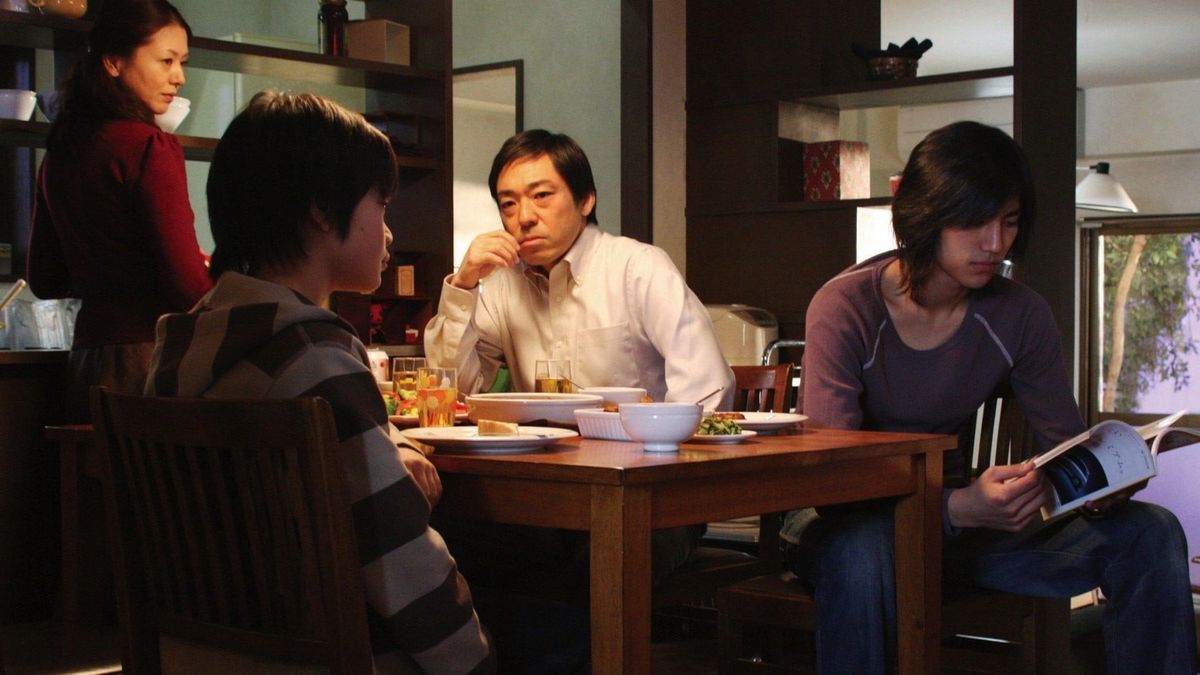By Chlotrudis Independent Film Society
Rating: 4 cats
Director: Kiyoshi Kurosawa
Starring: Haruka Igawa | Inowaki Kai | Kanji Tsuda | Kyôko Koizumi | Teruyuki Kagawa | Yû Koyanagi

Country: hong_kong, japan, netherlands
Year: 2009
Running time: 119
IMDB: http://www.imdb.com/title/tt0938341/
Jason says: “There have been many sequences in movies where someone loses his or her job, but few have been so callously cruel as the one that opens TOKYO SONATA: A pretty girl walks through an office, drawing all eyes. She goes into a room and briefly greets an executive, who is impressed with her Japanese; they can move this division to China and hire three like her for what one of their current Japanese employees costs. Before she’s left the building, Ryuhei Sasaki (Teruyuki Kagawa), a twenty-year employee, has been called into the Vice President’s office and asked what position he can fill in the company with his department being outsourced. None? Then pack your things and go.
“That this is happening all over doesn’t make it any more palatable for Sasaki, and doesn’t keep him from considering it a shameful failure on his part. He tries to sneak into his house that evening, and the next morning leaves without telling wife Megumi (Kyoko Koizumi) that anything has changed. Meanwhile, Megumi continues to keep house, with older son Takashi (Yu Koyanagi) coming and going at odd hours and younger son Kenji (Inowaki Kai) getting in trouble with his teacher before his chance passing of a piano teacher’s house inspires him to ask for lessons, which his father refuses. He signs up anyway, paying Ms. Kaneko (Haruka Igawa) with his monthly lunch money.
“This may not sound like the material for a movie by Kiyoshi Kurosawa, one of Japan’s most popular horror filmmakers, at least not at first glance. Look a little closer, though, and it doesn’t seem like such a stretch: Kurosawa’s films straddle the art-house and the grindhouse, and they’ve seldom been entirely or even primarily about ghosts and monsters. The source of the unease in his films is less something hideous that may jump out at you, but a world that no longer operates by familiar or logical rules. Tokyo Sonata presents us with a world where the rules no longer apply because of economic malaise rather than the supernatural, but this is still prime Kurosawa territory.
“Which is not to say it is a horror movie in disguise. It is, instead, a family drama with frequent streaks of bone-dry comedy. There’s a frequently hilarious recurring joke about how Ryuhei isn’t the only man pretending that he is still employed, which even manages a nice call-back after we’ve seen the worst of where that line of thinking can lead. Kenji is less than thrilled by how his talking back to his teacher effectively destroys order at his school, although the complete shift in the class’s behavior is pretty funny. Koji Yakusho has a bizarrely funny role.
“The cast is great at showing the audience what this strange situation is doing to the the family. Kagawa radiates embarrassment and shame as Ryuhei, cranking it up a notch in job interview scenes, where we see that working at the same place for so long has made it almost impossible to look for another job. Kagawa also does a nice job of transforming that shame to anger when called upon to do so. Kyoko Koizumi is excellent as Megumi, gradually revealing her as the down-to-earth glue that holds the family together, without making her early simplicity seem out-of-character. Inowaki Kai is wonderfully awkward as Kenji, just this awkward kid trying to do well and do the right thing and not understanding why the adults just won’t let him.
“As great as much of the movie is, it threatens to go completely off the rails in the last act. A good chunk of the audience seemed to feel like it did at the time, as things get very strange for all three of the main characters at once, and they do things that on the face of it don’t seem to make a whole lot of sense. I think it works, playing on the idea that things just seem so out of whack for the Sasakis that running away is what makes the most sense. It comes together, especially with how Kurosawa makes use of the repeated shot of an intersection on the Sasakis’ street, but it’s such a severe shift toward downright strange events and dark tone that he may lose a chunk of the audience there.
“I admit, he nearly lost me; as much as I enjoy the occasional ‘what the hell, Japan? what the hell?’ movie, it didn’t seem like the right time. Kurosawa makes it work, though, well enough to pull the whole thing together.
4 cats”
Diane responds: “Yep, he lost me in the last third. As soon as the characters started owning up to their problems and became self-pitying, I lost interest in them. There’s great value in obliqueness, especially in a Japanese film. 3 cats, for acting (best actor nom for Teruyuki Kagawa) and camerawork in the kitchen/eating area.”
Toni says: “I just saw TOKYO SONATA and found it quite poetic and like the falling and rising of the characters similar to characters in Mike Leigh’s character. I liked the fact that I felt most emotions throughout the film from the laughter with the ‘former’ friend that has the cell that he has set to ring on his own to the surprise and sorrow of each character when they hit rock bottom to the tension of the piano instructor and the younger son when he reaches out to her. I also loved the close of the film with the simplistically and symbolic beautiful piano playing with the building crowd. I felt connections in some way to each of the characters in the film and think it was a noteworthy Oscar contender. 5 cats”
